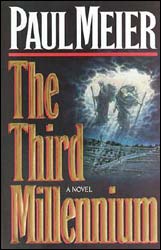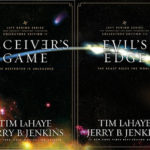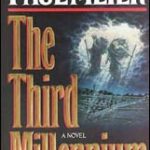Learning From Bad Books, Part 4
“The eye cannot say to the hand, ‘I have no need of you,’” the Apostle Paul famously remarked in his comparison of diverse-gifted Christians with body parts. But two weeks ago I asked: what happens if the eye says to the hand, “Hey, I want your job?”
Writers of many novels, bad or otherwise good, fall into that trap. And that’s not only because such authors may have had other callings and likely should not attempt novels, but because a real novelist who writes in a certain genre would best avoid a genre he doesn’t know about.
Worst-case scenario, the writer seems unaware of his ignorance. Yet even in the best cases, I wonder if the writer may actually seem to fear the very genre to which his story is headed.
Beware jumping genres
Fantasy as a genre almost scares me.
I don’t mean that reading it is intimidating, for religious reasons, or that I fail to see the real-world relevance of fantasy. Rather, because I’m started a new project this year, actually trying an Epic Trilogy with a Created Imaginary World, the thought of writing fantasy gives me pause.
This is a good thing. It means I might not take lightly this genre’s conventions (either to obey or deviate from) and may not ignore how other writers have done well. My wife and I have begun reading The Silmarillion together. Even if I’m not aiming for high fantasy, why not re-learn from a master of this craft and this genre? (And no, by the way, I’m not hoping to imitate Tolkien, yet I might remind others that trying too hard to be “original” so often fails.) Maybe along with my existing enjoyment of the genre, and humility to learn from its crafters, fantasy won’t scare me.
It should have scared author(s) of the 1990s Millennium end-times books I’ve been picking on. Even if he/they did admit to themselves, Okay, this is fantasy, so let’s not shy away from it, it doesn’t seem they were at all aware of how to handle fantastic events or creatures.
Next week, I hope to consider a book that apparently did fear fantasy. But summarizing a few of these may help readers and writers determine why some Christians’ over-exuberant fantasy attempts at fantasy just fail.
 Shut down the splash. Fantastic events should have a point. On the front cover of The Third Millennium is an illustration of two white-glowing figures dropping out of the clouds. This is supposed to be Moses and Elijah, a literal return of the two prophets as witnesses (based on a particular reading of Revelation 11). In the book, when these two appear, it’s obvious to bad guys and good guys alike (not much subtlety in TTM) that this is supernatural — but the description of the two men “materializing” with all these special effects does nothing to further the story.
Shut down the splash. Fantastic events should have a point. On the front cover of The Third Millennium is an illustration of two white-glowing figures dropping out of the clouds. This is supposed to be Moses and Elijah, a literal return of the two prophets as witnesses (based on a particular reading of Revelation 11). In the book, when these two appear, it’s obvious to bad guys and good guys alike (not much subtlety in TTM) that this is supernatural — but the description of the two men “materializing” with all these special effects does nothing to further the story.
Watch the believability. Even in nonfiction Christians screw this up, presenting rather weak reasons to have faith in Jesus (there are secret codes in the Bible!) rather than focusing on the more-vital truths (Christ rose from the dead). What would an Old-Testament prophet who’s just materialized out of the clouds say if asked for a sign? How about: Hel-lo, I just materialized out of the clouds? Moses of TTM doesn’t do that. Instead he gives some spiel about how the name Elohim and the word Torah are encoded in the Old-Testament Scriptures, and they can check that out with some of those modern computer devices you have. Yeah. That just isn’t believable.
Quotation marks aren’t magic. Fantastic elements don’t seem more real if they’re described by characters. This is especially true if an already-vellum-thin and unbelievable character is saying it. Figure A: “The smoky atmosphere is making the sun appear to be black. But look at the moon that’s coming up! It’s blood red!”
Fantastic elements set on the real Earth should match some reality. I’ll have more to say about this in coming weeks. But in summary: if you write a novel trying to be about the real world, and especially about the real God, don’t violate reality. I can believe that someone could jump to another world where God works differently. But if a writer hopes to keep me in the real world and accept wrong ideas about God here — such as “He could be a she” — I’m gone.
Perhaps you can think of other fantasy-fiction fails, common to Christian authors who jump genres without understanding better how speculative fiction works. I’m definitely still learning this myself (along with, say, being reminded of the deeper reasons a character may seem shallow as Becky pointed out so well last week!). And what might you have learned from such books?
(Next week: some Christian authors mangle fantasy elements, but others seem to fear them …)








































(And no, by the way, I’m not hoping to imitate Tolkien, yet I might remind others that trying too hard to be “original” so often fails.)
Thank you. 0=)
This is supposed to be Moses and Elijah, a literal return of the two prophets as witnesses (based on a particular reading of Revelation 11). In the book, when these two appear, it’s obvious to bad guys and good guys alike (not much subtlety in TTM) that this is supernatural — but the description of the two men “materializing” with all these special effects does nothing to further the story.
I vaguely remember that part. They’re kinda mean in Left Behind, if I recall. Personally, the last time Moses and Elijah dropped out of the sky, they were concerned only with talking to Jesus. I’m not sure they even acknowledged Peter, James, and John. That might be something to consider. (In regards to the believability paragraph.)
I think end times fiction has two real problems to it:
1). The perspective of the writer colors the entire story.
2). The events are, therefore, already known. It’s sort of like watching The Titanic: The boat sinks. And they tend to recite large sections of Scripture, usually from KJV as it’s been around long enough to not violate a copyright law.
It’s weird. I’ve read other retellings of other stories in Scripture and they don’t seem to have as much a problem with it–mildly amusing since Revelation hasn’t happened yet and David & Goliath has.
Anyway, that might explain the lack of appropriate reaction, or the meandering from furthering the plot: Rather than stick only to key events, the writer falls into this trap of thinking every tiny detail has to be in there. (Because, while it’s cool to see two guys drop out of the sky, if it’s not pushing things along they may only get a mention or not be included.) And the lack of subtlety.
But if a writer hopes to keep me in the real world and accept wrong ideas about God here — such as “He could be a she” — I’m gone.
What, you mean he couldn’t????? (I’m so kidding.)
More seriously…was that really in there? (Middle school was over a decade ago.)
This has nothing to do with this article but Kaci how is it I review with you over at FictionAddict.com and Stuart, I’ve interviewed you three times and didn’t realize you were a part of this site? And if either answers it because of my age I promise to write very bad things about your next books. You wouldn’t want the vast audience that looks to me for reading advice to turn on you. 😀
Tim, it’s not your fault at all. I’ve only got the one interview with Stephen and this second article on SpecFaith – I’ve only just started posting over here. And I’m horribly quiet about things like that. (Really. Major events happen in my life, and I might not breathe a word for at least a week.) So no worries. 0=)
And age is merely a state of mind. *shrug*